PCI, in collaboration with World Food Programme (WFP) and the Government of Ethiopia, is pleased to announced that it has won a competitive grant from the Development Innovation Ventures (DIV) program at the US Agency for International Development. With $100,000 in Stage 1 support from DIV, PCI will pilot a satellite technology that brings real-time information to pastoralists who rely on accurate reports of grazing conditions to successfully raise livestock in support of their communities.
At a time when climate change is making traditional methods of finding pasture increasingly unreliable, SAPARM, or Satellite Assisted Pastoral Resource Management, fills a critical information gap for pastoralists by allowing them to monitor grazing conditions on a continuous basis. This innovation has the potential to help millions of pastoralists by improving their ability to pinpoint adequate grazing land and reducing the downward trend in livestock mortality.
Ethiopia is currently home to an estimated 11 million pastoralists, and pastoral areas make up 60% of the country’s total land mass. The ability of pastoralists to migrate strategically throughout the season to access water and grazing grounds is critical to their survival. However, decisions on where to migrate are often informed by delayed and imprecise information; a wrong decision could have devastating long-term consequences, resulting in both widespread livestock death. When this occurs, pastoralists lose necessary income, and communities lose access to food. As changes in climate become less predictable, reliable traditional methods such as indigenous knowledge and weather indicators are losing effectiveness, and these problems are becoming more prevalent.
In response to these challenges, PCI developed an innovative solution that uses information from geo-stationary satellites to map traditional grazing areas and generate automated vegetation maps (using the Normalized Differential Vegetation Index) with accuracy down to a 10km2 area. These maps are generated using an existing software called LEAP, originally developed by WFP and currently used by the Government of Ethiopia for drought early warning. Auto-generated, these maps will be distributed to the pastoralists every 10 days through existing government and community structures. The maps only encompass areas that have been identified as traditional grazing grounds for a given community and verified with host communities to avoid conflict.
“Helping pastoralists make more informed decisions on where to take their herds will not only reduce overall humanitarian response costs, but we hope will significantly reduce the livelihood losses incurred by pastoralists themselves,” said Chris Bessenecker, PCI’s Vice President of Strategic Initiatives.
Initiated in August, the program has now provided maps to 16,000 pastoralists’ households. Initial feedback suggests that the maps are already saving pastoralists time, money, and energy, and allowing them to make informed decisions. Throughout the project, PCI will determine the long-term benefits of the technology by measuring reductions in livestock loss and reductions in costs for food assistance across two groups.
While specific levels of access to information and dissemination mechanisms vary from country to country, pastoralists around the world share the common challenge of limited access to the most advanced, current and precise information on water and vegetation locations. Successful long-term integration of geo‐spatial data within community frameworks could potentially have a profound impact on millions of pastoralists, in Africa and beyond.
For more information about PCI’s life-changing efforts, please contact Bonnie Maratea at (858) 279-9690 or bmaratea(at)pciglobal(dot)org.
###
PCI (Project Concern International) is an international health, development and humanitarian assistance organization, operating in 15 countries worldwide. Funded by federal grants and private support, PCI is dedicated to saving lives and building healthy communities around the globe, benefiting over 5.8 million people annually in Asia, Africa and the Americas. PCI’s headquarters are located in San Diego, CA and the organization also has an office in Washington, DC and a Seattle, WA representative. PCI’s current annual budget is $49 million and the organization has nearly 600 employees worldwide.
USAID’s Development Innovation Ventures (DIV) is an investment platform that finds, tests, and scales solutions to development challenges around the world. Through a year-round open competition for ideas, DIV seeks ideas that demonstrate cost-effectiveness relative to traditional approaches, that gather rigorous evidence of their intervention’s impacts, and that have the potential to scale through the public or private sector without long-term DIV support. For more information, visit http://www.usaid.gov/div and follow us on Twitter @DIVatUSAID.




Be the first to comment